
Steps to hire remote developers

Table of Contents
- What is remote developer?
- Factors to consider before hiring remote developers
- Define your requirements
- Sourcing candidates
- Screen applicants
- Conduct initial interviews
- Test technical skills
- Reference checks
- Make an offer
- On-boarding
- Step by step guide of hiring remote developers
- Principal challenges
- Communication barriers
- Technical infrastructure
- Time zone differences
- Monitoring and accountability
- Onboarding and training
- Security concerns
- Work-Life balance
- Benefits of why should we hire remote developers?
- Platforms for hiring remote developers
- Why Choose DevProvider IT Staff Augmentation Services as your Remote development team?
- Our Partner
- Conclusion
As the global workforce continues to embrace remote work, businesses are presented with a wealth of opportunities to tap into a diverse talent pool and operate on a global scale. The remote work revolution, accelerated by the COVID-19 pandemic, has ushered in a new era of flexibility, productivity, and global collaboration. However, managing remote teams across different time zones poses unique challenges that require careful planning, effective communication, and strategic solutions. At ‘Devprovider,’ we have honed our expertise in navigating the complexities of remote work, successfully integrating distributed teams into our culture. In this article, we explore the steps involved in hiring a remote developer and provide insights into navigating time zone challenges for seamless collaboration.
Building a remote development team isn’t just about finding technical skills, it’s about fostering communication and productivity across borders. This simple overview guides you through five key steps.
- Clearly define project needs and desired cultural fit.
- Create a compelling job description that showcases your company and the benefits of remote work.
- Put your entire network on a suitable remote platform to reach a diverse pool of talent.
- Assessing skills and fit using technical assessments, behavioral interviews, and testing potential projects to ensure skills and culture alignment.
- Onboard and integrate new hires with thorough documentation, clear communications, and virtual team bonding opportunities. This is accompanied by regular feedback for consistency and success.
By following these steps, you can unlock the potential of your remote developers and build a successful team, even when you’re away.
What is remote developer?
A remote developer is someone who works on computer programs or software from a location outside the office, such as their home or a coffee shop. Instead of going to the office every day, they use the computer to work and chat online with their team. Remote developers write, test, and patch code to keep the software working properly. They also plan and organize projects with their team. Working remotely gives developers more freedom and flexibility with their schedule, so they can better balance work and other parts of their lives.
Factors to consider before hiring remote developers
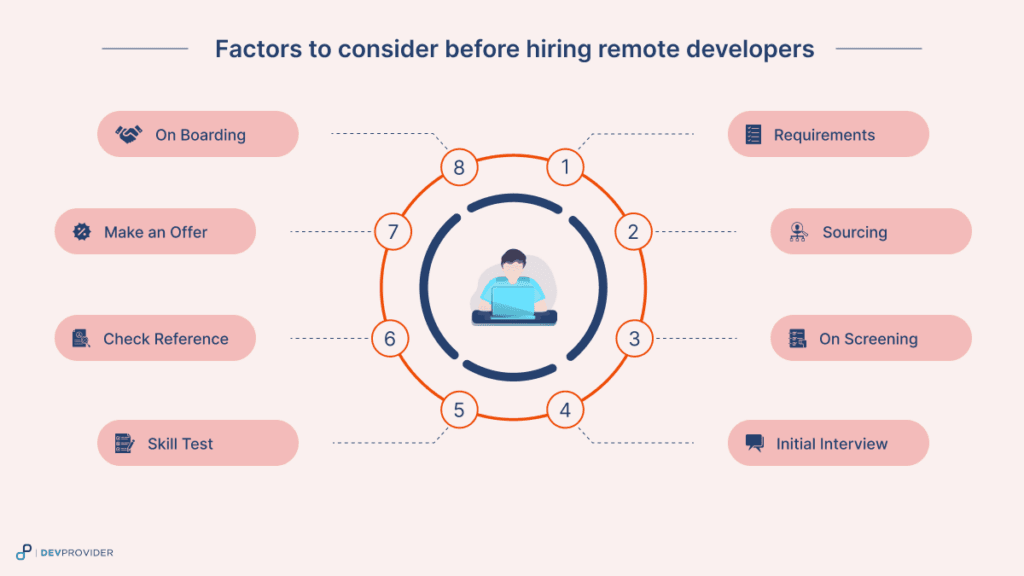
Define your requirements
Describe the skills, experience, and qualifications required of a remote developer. Identify technology, language, and specific project requirements to effectively target your research.
Sourcing candidates
Use online platforms, job boards, and professional networks to source potential candidates. Consider platforms like LinkedIn, GitHub, and remote-specific job boards like We Work Remotely and Remote.co.
Screen applicants
Review resumes and portfolios to shortlist candidates who meet your requirements. Look for relevant experience, technical skills, and a proven track record of success in a remote work environment.
Conduct initial interviews
Schedule virtual interviews to assess candidates’ communication skills, cultural fit and motivation. Using video conferencing tools such as Zoom or Skype, you can conduct face-to-face interviews and assess their suitability for the role.
Test technical skills
Administer coding tests or assignments to assess candidates’ technical skills and problem solving skills. This step ensures that you have the necessary skills to perform well in the role.
Reference checks
Access references provided by candidates to verify their work history, skills and performance. This step helps validate their qualifications and suitability for the role.
Make an offer
Extend a formal offer to the selected candidate stating terms of employment, including compensation, benefits and start date. Be transparent and flexible during negotiations to reach a mutually beneficial agreement.
On-boarding
Provide comprehensive onboarding materials and resources to help new hires integrate into your team and company culture. Schedule a virtual orientation session and assign an instructor to support the flight process.
Read about: 10 steps for Employee Onboarding Process
Step by step guide of hiring remote developers
Sourcing
To hire remote developers, it’s crucial to define the job description and outline the necessary skills, experience, and qualifications needed for the position. Access to remote talent can be facilitated through various channels such as remote desktops, specialized platforms, and professional networks. Furthermore, working with remote staffing agencies or attending networking events online can make sourcing easier.
Screening
The screening process for remote developers involves examining their resumes and portfolios to identify potential candidates who meet specific job requirements. By conducting coding tests or skills assessments, initial assessments can be conducted remotely to assess candidates’ technical abilities. By conducting telephone or video interviews, can be utilized to evaluate communication skills and cultural fit in a remote work environment. This is of great importance.
Interviewing
The structured interview process for remote developers is planned out of this in part by creating questions that are relevant to the candidate and criteria used to evaluate candidates consistently. Behavioral interviews examine candidates’ past experiences and problem-solving proficiency, while cultural fit assessments verify their suitability for telecommuting and company culture. During the remote interview process, different perspectives can be gained by taking into account key stakeholders such as team members and managers.
Offering
The formal offer made to remote developers must include explicit terms such as compensation, benefits, and the date of joining. It may be necessary to reach a compromise on terms that address any concerns or questions raised by the candidate, which could result in conflict. The acceptance of the offer in writing indicates the remote developer’s dedication to the position.
Related: Wants to Explore 10 Steps for the Employee Offboarding Procss
On-boarding
Creating a comprehensive onboarding plan for remote developers includes outlining their first weeks or months, including virtual orientation sessions and training programs. Providing the necessary resources, such as remote access to tools, software, and equipment, is critical to the success of remote onboarding. Assigning a mentor or buddy offers support and guidance while asking for feedback ensures that the remote developer feels valued and integrated into the remote team.
Related: Explore about Best Websites to hire web developers remotely
Principal challenges
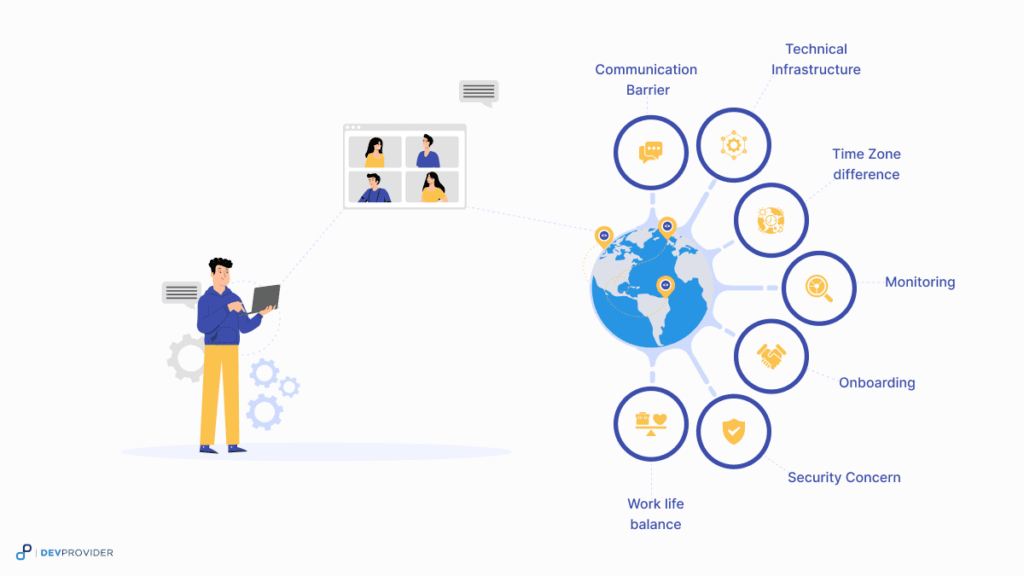
Hiring remote developers comes with its own set of challenges. Some of the principal challenges include:
Communication barriers
Working remotely can sometimes lead to miscommunication or misunderstandings due to the lack of face-to-face interaction. Different time zones, language barriers, and reliance on digital communication tools can exacerbate this problem.
Technical infrastructure
Ensuring that remote developers have access to the necessary technology, tools, and infrastructure to do their jobs effectively can be a challenge. This includes a reliable Internet connection and appropriate hardware and software licenses.
Time zone differences
Coordinating work across different time zones can pose logistical challenges, especially when attending meetings, collaborative work sessions, or addressing urgent issues.
Monitoring and accountability
Without physical monitoring, monitoring the productivity and progress of remote developers can be challenging. Establishing clear expectations, milestones and performance metrics is essential to ensure accountability.
Onboarding and training
On-boarding remote developers requires careful planning and coordination to ensure they have the necessary resources, training, and support to integrate into the team and begin contributing effectively.
Security concerns
Remote work introduces additional Cybersecurity risks, such as data breaches, unauthorized access to sensitive data, and compliance issues. It is important to implement good safety measures and protocols to reduce this risk.
Work-Life balance
Remote developers can struggle to maintain a healthy work-life balance, especially if they work in different time zones or have flexible schedules. Encouraging boundaries, setting clear expectations, and encouraging self-care practices can help overcome this challenge.
Overall, addressing these challenges requires proactive management, clear communication, and a commitment to supporting remote developers in their roles. By recognizing and addressing these challenges, organizations can maximize the success of their remote recruiting initiatives and build high-performing remote teams.
Related: How to manage remote IT teams
Benefits of why should we hire remote developers?
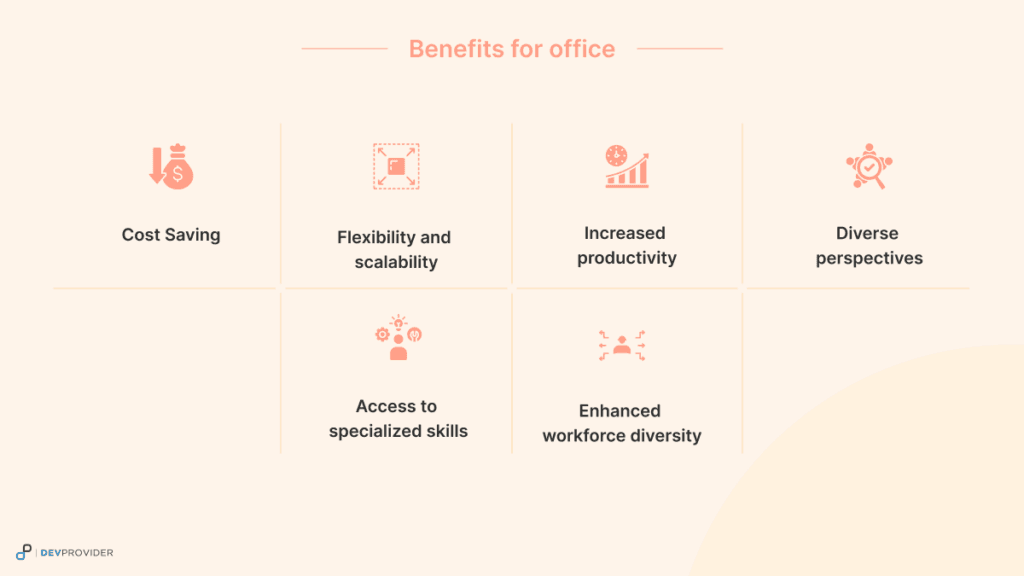
Benefits for Staff Augmentation Company
With the availability of a wider range of talent, cost, productivity, and workforce diversity, hiring remote developers is an attractive option for businesses.
Cost savings
It is common for developers to work remotely without requiring office space or equipment, and with overhead costs associated with in-house staff.
Flexibility and scalability
By utilizing remote development services, businesses can have the ability to adjust their team’s schedule and workload without the need for an office-based hiring process.
Increased productivity
By being able to work at their optimal hours, developers can maximize productivity and efficiency when working from home rather than in an office.
Diverse perspectives
Bringing in a range of perspectives and experiences to the team through employment placement can promote creativity and innovation in project development and problem-solving.
Access to specialized skills
By specializing in specific skill and technology categories, remote developers can enhance the development team’s quality by providing expertise that may not be available locally.
Enhanced workforce diversity
Hiring remote developers can promote diversity in the team by allowing individuals from diverse backgrounds, cultures, and demographics to participate.
Benefits for employees
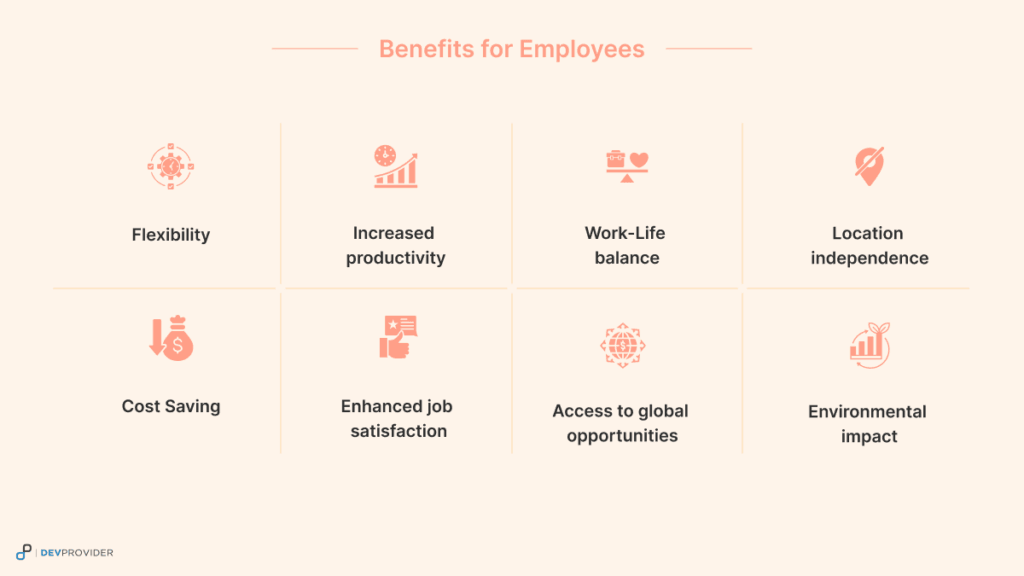
Hiring a remote developer offers employees several benefits that help maintain work-life balance, job satisfaction, and overall well-being.
Flexibility
The ability to work remotely allows employees to create their own work schedules and surroundings, which helps them maintain a better balance between personal and professional duties.
Increased productivity
By working remotely, employees can avoid the distractions and interruptions that are common in office environments, resulting in increased productivity and improved productivity.
Work-Life balance
The balance between work and personal life can be better managed through remote work, which allows employees to spend more time with their families and pursue their hobbies.
Location independence
Remote work enables employees to work from anywhere thanks to internet access, which eliminates the need for geographical boundaries and allows for travel and relocation opportunities.
Cost savings
The cost of commuting, including transportation and food expenses, can be reduced by eliminating employee expenses during remote work.
Enhanced job satisfaction
Workers who work from home are given more freedom and control over their work environment, which leads to greater job satisfaction and overall employee happiness.
Access to global opportunities
The ability to access job openings worldwide through remote work provides employees with a wider range of career and professional prospects.
Environmental impact
Remote work can help reduce the carbon footprint associated with commuting and office operations, while also supporting environmental sustainability efforts.
Platforms for hiring remote developers
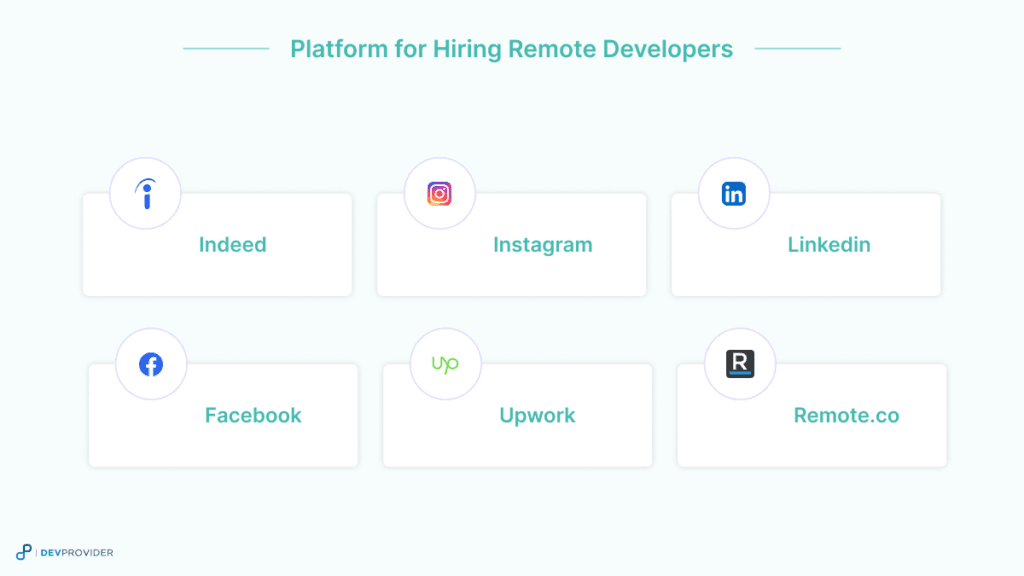
Indeed
Indeed is a vast job search platform with millions of listings across various industries, including remote opportunities. Employers can post remote job openings and use filters to target specific skills and locations. Job seekers can easily find remote developer positions, upload resumes, and set up job alerts.
Although primarily a photo-sharing platform, Instagram can be used for recruitment by showcasing company culture and remote work opportunities. Employers create visually engaging posts highlighting remote job openings and company events, attracting potential remote developers through relevant hashtags and engaging content.
LinkedIn, the largest professional networking platform, offers features for hiring remote developers. Employers post remote job listings, target specific audiences, and use LinkedIn Recruiter for candidate outreach. Remote developers showcase skills, connect with recruiters, and find remote job opportunities through job search and recommendations
Related: DevProvider
Facebook provides tools for businesses to recruit and hire remote developers. Employers create job postings, target demographics, and reach potential candidates through sponsored posts. Facebook Groups dedicated to remote work offer networking opportunities and connections with remote developers.
Upwork
Upwork connects businesses with remote professionals worldwide. Employers post job listings, review freelancer profiles, and manage projects using Upwork’s tools. Additional features like Upwork Pro and Upwork Enterprise cater to businesses seeking premium talent and support.
Remote.co
Remote.co is a job board and resource hub focused on remote work. Employers post remote job listings across various industries, reaching remote job seekers interested in flexible work arrangements. Remote.co offers insights, articles, and guides on remote work best practices and resources for job seekers.
DevProvider
DevProvider specializes in connecting businesses with skilled developers and tech professionals for remote work. Employers can post technical job listings, review candidate profiles, and manage projects through DevProvider’s platform, which also offers tailored solutions for tech hiring needs.
Why Choose DevProviderIT Staff Augmentation Services as your Remote development team?
DevProvider offers numerous advantages as a top remote development team. With a proven record of experience delivering high-quality software solutions, their team of skilled developers ensures goals are met efficiently. Seamless collaboration is prioritized through agile methodologies and effective communication. Flexible engagement models and competitive pricing provide cost-effective solutions without sacrificing quality. As a PSEB-certified company, DevProvider develops securely and compliantly. With engineers based in Pakistan, clients benefit from timezone overlaps for collaboration.
Our Partner
As our partner, The Right Software handles full project management so you can focus on core work. Rapid scaling of resources meets changing requirements while maintaining continuity. Overall, DevProvider’s experience, processes, pricing, and geographic advantages make them a top choice for outsourced staff augmentation needs.
Conclusion
Contact DevProvider today to embark on your journey towards remote web development success. We are committed to helping you harness the power of remote talent and propel your business to new heights.
If you have your own website want to connect businesses with remote developers, or want to Hire Remote Developers contact us today.
Tags: hirirng, interviews, offboarding, onboarding, remotedevelopers, softwaredevelopers

